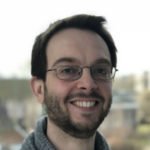
Leiden University Medical Center
Leiden, Netherlands
g.sanchez_duffhues@lumc.nl
Following my Biochemistry education in the University of Cordoba (Spain), I enrolled my PhD studies at the Department of Cell Biology, Physiology and Immunology in the same University. During this stage I investigated the signal transduction pathways activated by pro-inflammatory cytokines. In this respect, I focused on the molecular mechanisms responsible for viral latency and reactivation, as well as identified novel (semi)synthetic compounds with anti-inflammatory properties, therefore blocking viral reactivation. Since I joined the Department of Molecular Cell Biology at Leiden University Medical Center (LUMC, Leiden, The Netherlands) in 2011, headed by Prof. Peter ten Dijke, I have become interested in the mechanisms by which ligands of the Transforming growth factor-β family (including TGF-βs and Bone morphogenetic proteins, BMPs), together with pro-inflammatory mediators, regulate the function of endothelial cells (ECs) and, in particular, a phenomenon termed Endothelial-to-Mesenchymal transition (EndoMT). EndoMT refers to a process by which ECs lose their endothelial features (e. g. organization in cell layers, absence of invasiveness and expression of the endothelial markers CD31/PECAM-1, VE-cadherin, and VEGFR) and acquire a mesenchymal phenotype (e. g. absence of cell-cell junctions, highly migratory potential and expression of specific cell markers: fibroblast specific protein-1, smooth muscle actin, fibronectin, etc) (1). This process can eventually result in chondrogenic and osteoblast-like cells; therefore it has been thought to be relevant for a number of adult pathologies that somehow mimic the process of endochondral bone formation, such as vascular calcification and heterotopic ossification, including Fibrodysplasia ossificans progressiva (FOP). Moreover, tissue engineering applications could take advantage of such a mechanism, by using ECs as a relatively easy source of patient derived multipotent material.